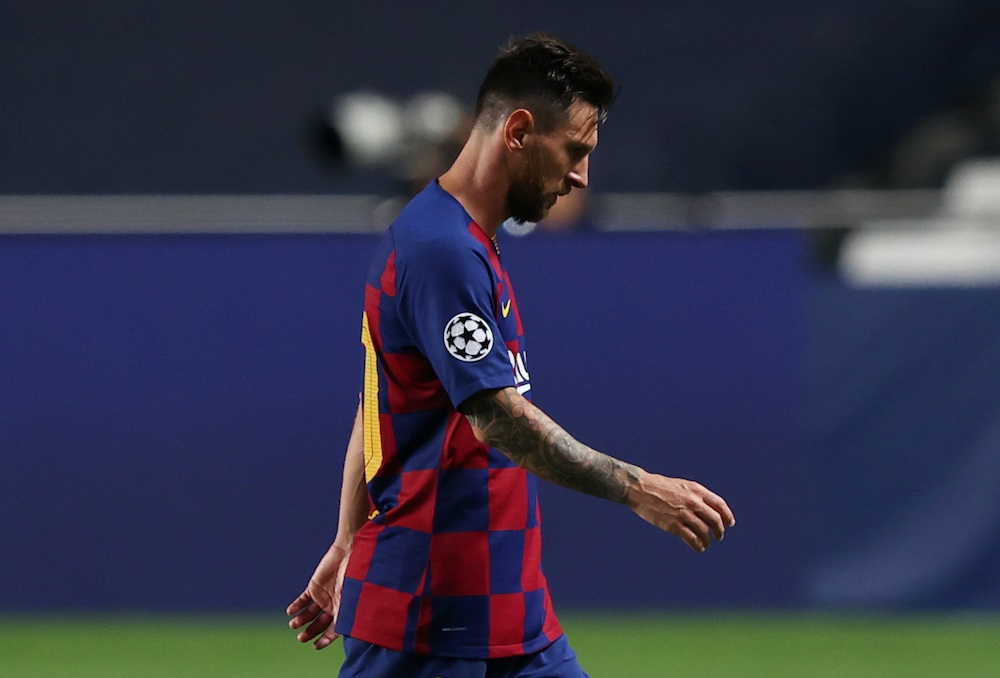
Soccer Football – Champions League – Quarter Final – FC Barcelona v Bayern Munich – Estadio da Luz, Lisbon, Portugal – August 14, 2020 Barcelona’s Lionel Messi looks dejected after the match, as play resumes behind closed doors following the outbreak of the coronavirus disease (COVID-19) REUTERS/Rafael Marchante/Pool
LISBON: For the first time in 13 years, there is no Spanish team in the semi-finals of the Champions League and the way in which Barcelona were dumped out, with an 8-2 defeat to Bayern Munich, emphatically ended the era of La Liga supremacy.
There was one basic similarity in the way that Barcelona, Real Madrid and Atletico Madrid exited Europe this season — they simply looked too slow.
It is not that their players individually lack speed but that their styles of play lack the intensity and dynamism, the relentless pressing of the top German and English teams.
The Spanish sides are not able to attack with that same forcefulness, to turn from defence to attack in a matter of seconds, and they also defensively struggle to handle teams that play in such a manner.
Barcelona’s capitulation was the most blatant example of how far behind Spain has fallen in terms of the tactical evolution of the game.
Less than a decade ago Barca were the cutting edge of modern football — their tiki-taka short passing game and their supreme control of possession simply condemned opponents to a painful death.
Under Pep Guardiola, they were technically outstanding and superbly drilled, with players developed from a young age to master the skills required to produce this geometric game that few opponents could handle.
An often under-estimated part of the Barca method under Guardiola, which brought Champions League titles in 2009 and 2011, was just how quickly his team could retrieve the ball once they had lost it.
There was little sense of that hunger to quickly seize back control against the rampant Germans yesterday.
More recently, Real Madrid’s successes in Europe, with four Champions League titles between 2014 and 2018, came with a different style. But since the departure of Cristiano Ronaldo, they have lost their fear factor for opponents.
Exploited perfectly
Like Barca, they have struggled when trying to play the ball out from the back against an aggressive press — a factor which Guardiola, now with Manchester City, exploited perfectly in his side’s win in the last 16.
Atletico Madrid built their success under Diego Simeone, which included two runners-up spots in the Champions League and a pair of Europa League titles, on outstanding defending and a clinical counter-attack.
But they have lost the attacking element, shorn of the invention of Antoine Griezmann and with Diego Costa no longer the danger he once was.
The one team in Spain that is the closest to the modern form of playing are Sevilla, who are the last La Liga team left in Europe, facing a Europa League semi-final against Manchester United.
Significantly, Sevilla play with a pair of attacking full-backs in Reguilon and Jesus Navas — a crucial component for the continent’s best.
Bayern, like last year’s champions Liverpool, have full-backs who are key to their attacks — as the fifth goal created by left-back Alphonso Davies for right back Joshua Kimmich, emphasised.
That goal would have brought a wry smile from Liverpool manager Juergen Klopp, whose team have gained so much from the ability of his full-backs, Trent Alexander-Arnold and Andy Robertson, to deliver in the final third.
Ironically, it could be argued that the pioneer of that approach was Dani Alves at Barcelona, while Marcelo was a similar asset for Real Madrid.
But nothing emphasises how much times have changed than the way in which Guardiola, in Manchester, has evolved his own tactics.
The Catalan remains committed to the fundamentals of his beliefs — possession, crisp passing, the creation of space and the scamper to win back the ball.
His attacks always pressed but they do so now in a much more aggressive manner.
Phil Foden, playing as a ‘false nine’ against Real in the last 16, used that position to close down and frustrate the attempts to play the ball out and striker Gabriel Jesus’s pace was adopted for similar duties.
Bayern play that way, as do the other German semi-finalists RB Leipzig. Klopp’s Liverpool, like his old club Borussia Dortmund, are masters in that method.
Spanish coaches are among the greatest students of the game but they now have a new conundrum to solve — how to match teams who have pressed their clubs out of Europe.



